- Home
- Alison Weir
Anna of Kleve, the Princess in the Portrait Page 10
Anna of Kleve, the Princess in the Portrait Read online
Page 10
“The King is coming to Canterbury to meet your Grace!” he announced. “He cannot contain himself longer. You will be married there, and he himself will escort you thence to London.”
Anna caught her breath. In a few weeks she would see him, this man who had haunted her waking hours and her dreams for months. “His Majesty does me great honor,” she said.
“Indeed!” Mutter echoed. “I must warn Mother Lowe to ensure that you are royally attired when you enter Canterbury.”
“Admirable, admirable!” pronounced Dr. Wotton.
“Where is the marriage to take place?” Wilhelm asked. “Will it be in the cathedral? I hear it is a wonder of the world.”
“I could not say, your Grace. His Majesty’s previous weddings were solemnized in private.”
“It matters not to me where I am married to the King,” Anna said. “It is the uniting of ourselves, and our two great countries, that is important.”
Dr. Wotton looked at her appreciatively. “Your Grace has the nub of the matter. You will be pleased to hear that the Lord High Admiral of England and a great company of the lords of the Privy Council are preparing to leave for Calais, even as we speak. They are to receive your Grace there, and escort you across the English Channel.”
“I have arranged for my sister to be conveyed from here by four hundred horsemen,” Wilhelm said, not to be outdone.
Dr. Wotton bowed. “Excellent, Sire.” He turned back to Anna. “At Dover, the remaining lords of the Council will meet your Grace and conduct you to Canterbury to the King, who will bring you to London to celebrate Christmas. You will enjoy that, Madam, for at court they make merry the whole twelve days of the Yuletide season, with lavish celebrations, which are sure to be greater than ever this year in honor of your marriage. The King has ordained that, on New Year’s Day, you are to make your state entry into London; and you shall be crowned at Westminster Abbey on Candlemas Day.”
It all sounded wonderfully splendid, and far beyond Anna’s imaginings. Had ever queen received such a welcome?
* * *
—
A courier arrived from London, wearing red livery blazoned with a Tudor rose and spattered with mud from hard riding. The King himself had sent him, from the palace of Hampton Court. His Majesty was eager to know when her Grace would be departing.
“Immediately,” Wilhelm told him.
Chapter 6
1539
Wilhelm had gone to Schwanenburg, where Anna’s escort was to assemble on November 25, attired in appropriate clothing and armor. Never let it be said that Kleve did not send its princess in proud estate into England!
He had been planning Anna’s retinue for weeks: those who should go with her as far as Calais, those who should go to England, and those who should stay or come home. Many of the highest nobles and officers in the land were to accompany her. Dr. Olisleger would head the escort, and Dr. Wotton and his party would ride with it.
Back in Düsseldorf, making her final preparations amid a flurry of packing supervised by Mutter, who—alternately encouraging and haranguing—had performed wonders in the short time allowed her, Anna did not have long to dwell on the final farewells she must soon say. But there was good news from Brussels, brought by a messenger from Wilhelm.
“Anna,” Mutter announced, “the Queen Regent intends to send a noble person to ensure that you are well treated in the Emperor’s dominions till you pass Gravelines, which is where you will enter English territory. It is a most friendly and honorable gesture. Clearly, despite the ill feeling between Wilhelm and the Emperor over Guelders, you will be safe and protected in Flanders.”
“That is a wondrous relief.” Anna smiled. “Everyone has been so kind.”
“And so they should be!” Mutter said. Her all-seeing gaze traveled around the ladies’ chamber, taking in the iron-banded chests piled high, the canvas packs, the bags and boxes, all ready to be laden on the carts and sumpter mules that would follow Anna’s procession. She did not know that hidden among Anna’s personal possessions was a ring that was all that remained to remind her daughter of how precious love could be.
There was nothing left to do, save help Anna dress on the morrow, when they would depart for Schwanenburg, where she was to bid goodbye to her family.
“I cannot thank you sufficiently for equipping me so well,” Anna said, feeling a lump in her throat. She wanted to reach out and hug her mother, and never let her go, but Mutter had never encouraged overt displays of affection and emotion.
“It was my duty—and my pleasure,” Mutter said. “Now I am satisfied that you will be going to England accoutred like a queen.”
* * *
—
Anna could not sleep. Her pillow was wet with tears, as it had been on many nights in recent weeks. In the dark hours, one lay vulnerable to gloomy, desperate thoughts. She could not go to England and leave all she had ever known behind, probably forever. How could she have agreed to it? And it was not just Mutter and Emily and Wilhelm whom she could not bear to leave, but also that little boy in Solingen, for whose loss she grieved daily.
She would not go! She would tell them all she had made a terrible mistake. She would write, ever so apologetically, to the King, and explain. He could easily find another bride.
But then her conscience would prick her. What of the alliance, so vital to Kleve’s future security? What of the shame her jilting of the English King would bring down on Wilhelm—and on Henry himself? It would be the worst insult. What of Mutter, who had taught her to put duty first, and who had worked so hard to give her a good send-off? What of Dr. Olisleger, Dr. Wotton, and Lord Cromwell, who had been negotiating her marriage for months? What of all the lords and ladies of her escort, waiting for her at Schwanenburg? What would they say if they were ordered to disperse to their homes?
She could not lie there any longer, torn both ways by these tumultuous thoughts. She got up, dried her tears, slipped her feet into her velvet slippers and pulled on her heavy night robe furred with miniver. As she descended the stairs in the tower, a distant clock chimed midnight. And there, coming up the steps toward her, was Mother Lowe, swathed in a black cloak.
“My lady! I was just coming to find you,” she exclaimed in a loud whisper. “I have brought someone to see you. He is waiting below.”
Anna’s heart began to race. No, surely, it could not be…Mother Lowe had said it was impossible.
“Is it…?” she began, but her nurse was hastening down the stairs, so Anna followed her broad back to the courtyard below. A man in rich furred robes and a gold chain, a neatly dressed woman, and a small boy, wrapped up against the cold, were waiting on the cobbles. At the sight of her, the man made a deep obeisance and the woman bobbed a curtsey, giving the child a nudge. He too bowed.
“Solingen wishes to pay its respects and wish your Grace every felicitation,” Mother Lowe said. “May I present the Mayor, and Frau Schmidt and her son? These good people would have been here earlier, but they were forced to take shelter in a storm.”
The Mayor stepped forward, and Anna dragged her eyes away from the child.
“Your Grace, I bring the loyal and hearty wishes of all the people of Solingen. We have long had a special devotion to your House, for you and yours are so often at Schloss Burg, and we are sensible of the great good you are doing Kleve by consenting to this marriage. We wish to present you with a gift to mark it, and our gratitude. We decided that it should be presented by one of our youngest citizens. Step forward, boy.”
The child doffed his cap and drew from under his cloak a little casket. Anna could not stop gazing at his face. In the light of the torches in the wall sconces, he was beautiful, with blue eyes, cherry-red lips, and fair hair like hers and Otho’s; he had her long nose in an otherwise perfect face.
“Your Grace, please accept this humble token,” he said, as he had obviously be
en schooled to do. Anna bent down and took the casket, savoring the moment when her hand brushed his soft skin. Inside was a beautiful gold pendant in the shape of a heart, enameled in blue and red, with true-lover’s knots.
“Thank you,” she said, and, on impulse, leaned forward and kissed the boy on the cheek. She longed to fold him in her arms, but dared not. One kiss must suffice her hungry heart.
She stood up. “Herr Mayor,” she said, “this gift you have given me, and the charming way in which it has been presented, has touched me deeply. It is a beautiful jewel, and I will treasure it always in remembrance of you and the good people of Solingen.” Her voice faltered, and she feared she might break down, for, having briefly seen her child, she must now lose him again, and for good this time.
“Forgive me,” she said, “I am somewhat overcome with emotion at the thought of leaving Kleve and its people, who are so dear to me. And this gift embodies all that I am leaving behind. I give you my most humble thanks, and shall pray that God will bless you for your kindness.”
So saying, she gazed once more upon the sweet face of her son, then turned back to the tower, so that no one should see her tears.
Mother Lowe caught up with her on the stairs. She held Anna as she cried copiously.
“Oh, thank you, thank you for arranging that,” Anna sobbed. “You cannot know what it means to me.”
“Oh, but I can,” the nurse said, her voice muffled against Anna’s shoulder. “Long ago, before I was widowed, I had a child, a little boy. He died soon after birth. So yes, Anna, I do know what it is to ache for your little one. Any mother would understand it. And it was no trouble. The Mayor is a cousin of mine. When I heard he was thinking of having a child present the gift, a word in his ear was all it took.”
“He is gorgeous, my son. And he speaks so beautifully. The Schmidts have reared him well.”
“They dote on him. You can go to England happy in the knowledge that you have done your best for him.”
“Yes,” Anna conceded reluctantly, dabbing at her eyes.
“Now, let us to bed,” Mother Lowe said. “We’ve an early start in the morning.”
* * *
—
The chariot in which Anna would ride all the way to England stood waiting in the courtyard, an elegant, ornate enclosed carriage in the French style, beautifully carved and gilded, with the arms of Kleve colorfully blazoned, and a well for the driver in front, with the lion of Kleve fashioned in gold going before, like a ship’s figurehead. The roof was upholstered in cloth of gold, and blinds of the same material hung over the windows; you could tie them down firmly, for privacy, or to keep out the drafts. The four golden wheels were breast-high, and the interior luxuriously upholstered.
“What a splendid conveyance!” Anna cried, as she stepped out in her new traveling cloak, which had a wide hood and was lined throughout with sables. “It looks like the one Sybilla rode in to her wedding.”
“It is similar,” Mutter said, “and it is suspended on chains, so you should have a comfortable ride, weather and roads permitting.”
The courtyard was packed with carts, horses, and people. All the luggage was loaded, and before long, chaos had metamorphosed into order and they were ready to depart. Soon, the towers and spires of Düsseldorf were receding into the distance; Anna looked back wistfully as they disappeared from view. Mutter, sitting next to her, quietly laid her hand on hers and squeezed it—a rare gesture that betrayed her own feelings. Mother Lowe, sitting opposite, looked brightly at them both.
“It’s less than thirty miles to Duisburg, your Graces,” she said. They were lodging overnight in the castle there.
“And then only three hundred and twenty miles to go,” Anna smiled. “For me, at any rate.”
“Lucky you,” said Emily, who was sitting next to Mother Lowe. “I wish I was going to England.”
And you would probably have gone without a qualm, Anna thought. She settled back, cherishing precious memories of the night’s encounter, and gazing at her mother and her sister as if she would imprint their faces on her memory forever.
* * *
—
The next day, they arrived at Schwanenburg, where the Duke was waiting to receive them. The courtyards teemed with the hundreds of men-at-arms who would accompany Anna to Calais. When she entered the Rittersaal, she found it crammed with the more elite members of her escort, who cheered heartily when they saw her. She raised her hand in greeting as the Duke called for hush and steered her to the dais, where she sat down thankfully on the carved chair next to his; it stood beneath the cloth of estate because she was now, effectively, a queen.
As she waited for the presentations to begin, she studied the throng of people gathered before her, recognizing many members of the highest noble families of Kleve. There, at the front, was Dr. Olisleger, standing with her cousin, the portly Hermann, Count von Neuenahr, his second in command. Anna felt sorry for the Count, for he was leaving behind a sick wife; yet his proficiency in Latin and French was needed.
Mutter, resplendent in figured gold damask, was greeting her half-brother, Uncle Johann, the Bastard of Jülich, who might have been jealous of her inheritance, but was too genial and indolent to resent her. Anna saw her cousins, Anastasia Gunthera Schwarzburg and Franz von Waldeck, sharing a private joke as fourteen-year-olds will. Handsome Franz was the promising son of Anna’s aunt, another Anna of Kleve, and Philip, Count of Waldeck; he would serve as one of eight pages, while Anastasia would be one of Anna’s five gentlewomen. The others were clustered nearby around Susanna Gilman, who smiled and curtseyed as she caught Anna’s eye.
The trumpets sounded suddenly, and the heralds called out the names of those assembled, in order of rank. One by one, the members of Anna’s escort came forward, bowed low, and bent to kiss her hand. And suddenly, hidden from view until now—no, it could not be…Anna wanted to shrink back in her seat, and had to exert the most rigid control, for there, rising from his bow, mature now, and with his handsome face hardened into strong contours, was the man who haunted her memories with reminders of what might have been: Otho von Wylich. With him was a pretty, heavily bejeweled young woman. In that instant, Otho’s eyes met hers, and she saw in them a remembered warmth and the memory of the secret that lay between them.
She made herself smile at the couple, trying to ignore her heart pounding in her breast. Always, the past was coming back to taunt her for that one childish sin. Yet Otho was a joy to behold, even as she shrank from him. She held her breath as he came forward, but no one, watching him, would have suspected from his respectful demeanor that he knew her far better than he should. She was high above him now, sitting in state as queen, but all she could feel was terror that he was in her train and bound for England.
How had this happened? Mutter knew what he had done. Why had she not stopped Wilhelm from appointing him?
Dr. Olisleger was murmuring in her ear. “My nephew, your Grace, Florence de Diaceto. My sister married a Florentine, but he was born in Antwerp.”
Anna realized that Otho and his wife had moved on, and that a young man with long wiry hair and a pointed nose was making his obeisance. Despite the pounding of her heart, she made herself smile graciously at the debonair Florence, at Grand Master Hochsteden, and at Vice Chancellor Burchard and Marshal Dultzik; both had been sent by the Elector to show his support for the alliance.
The procession seemed interminable. The herald’s voice droned on and on: “My Lord Johann von Bueren-Drossard…My Lord Werner von Pallant, Lord of Bredebent…” Anna’s eyes were glazing over, and the smile was fixed on her face. “The Lady Magdalena von Nassau-Dillenborg…Lady Keteler…the Lady Alexandrine von Tengnagel…” The latter was a bent, wizened old lady who must be a hundred years old, and yet, Anna marveled, she was still coming to Calais. She remembered Wilhelm telling her how the old woman had insisted, saying it was her right. Maybe that
was what Otho had said too…
As soon as the long ceremony was over, Anna followed Mutter to the ladies’ chamber and quickly shut the door behind her before their attendants could catch up.
“Mutter, how did Otho von Wylich come to be in my train?”
Mutter shook her head helplessly. “He is your cousin. He has the right. What could I have said without arousing Wilhelm’s suspicions?”
“You could have said you don’t like him.” Anna was beside herself, pacing up and down.
“That would not have been sufficient excuse.”
“But, Mutter, his very presence could put me in danger. If there was any hint that there had been something between us, the King’s suspicions might be aroused. He might even think I had brought a lover with me.”
“Anna, you run away with yourself! Otho is married now. He loves his wife, and she him; your aunt told me. He will not imperil a happy marriage, nor his hopes of preferment in England. He too has much to lose. Put your mind at rest, and let us get ready for the feast tonight.”
Mutter was right; she spoke sense. Anna ceased pacing and gradually felt the tension ease. All the same, as soon as she could, she would contrive to have Otho sent home.
The chariot stood waiting by the gatehouse. The courtyard was packed with people and horses. Wilhelm kissed Anna on both cheeks.
“God go with you, Schwester. Write and let us know how you are faring in England.” Being Wilhelm, he could not resist a pompous exhortation. “Remember, you are there to maintain the honor of Kleve.”
“I will do all in my power to further the interests of my fatherland,” Anna promised. “Farewell. God keep you in health.” She took his hand and squeezed it. Tempted as she was, one did not hug Wilhelm.
Emily, by contrast, threw her arms around Anna. “I shall miss you so much,” she wept.

 Richard III and the Princes in the Tower
Richard III and the Princes in the Tower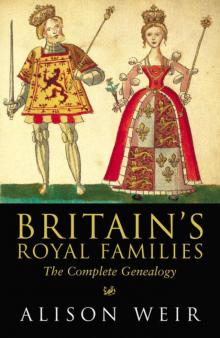 Britain's Royal Families: The Complete Genealogy
Britain's Royal Families: The Complete Genealogy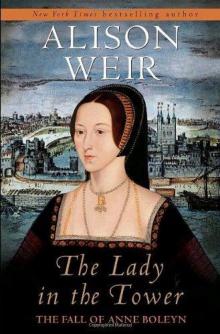 The Lady in the Tower: The Fall of Anne Boleyn
The Lady in the Tower: The Fall of Anne Boleyn Six Wives of Henry VIII
Six Wives of Henry VIII Elizabeth of York: A Tudor Queen and Her World
Elizabeth of York: A Tudor Queen and Her World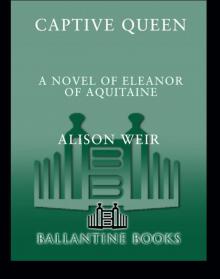 Captive Queen
Captive Queen Innocent Traitor
Innocent Traitor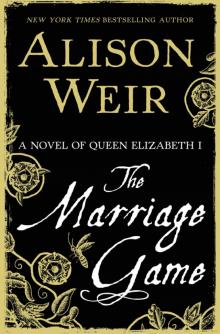 The Marriage Game
The Marriage Game A Dangerous Inheritance
A Dangerous Inheritance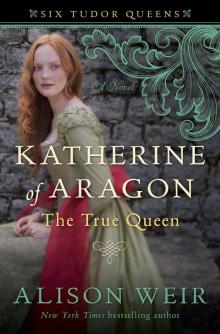 Katherine of Aragón: The True Queen
Katherine of Aragón: The True Queen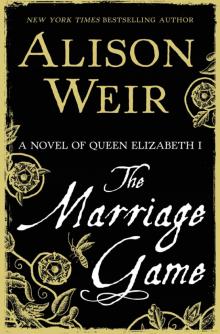 The Marriage Game: A Novel of Queen Elizabeth I
The Marriage Game: A Novel of Queen Elizabeth I Princes in the Tower
Princes in the Tower Anne Boleyn: A King's Obsession
Anne Boleyn: A King's Obsession Traitors of the Tower
Traitors of the Tower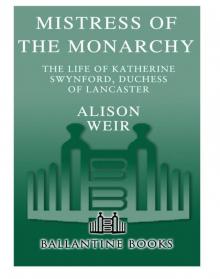 Mistress of the Monarchy: The Life of Katherine Swynford, Duchess of Lancaster
Mistress of the Monarchy: The Life of Katherine Swynford, Duchess of Lancaster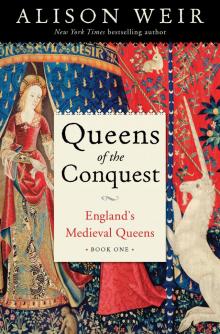 Queens of the Conquest: England’s Medieval Queens
Queens of the Conquest: England’s Medieval Queens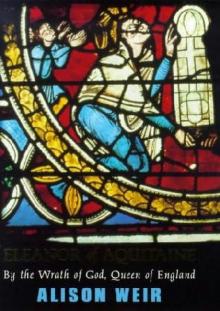 Eleanor of Aquitaine: A Life
Eleanor of Aquitaine: A Life Mary, Queen of Scots, and the Murder of Lord Darnley
Mary, Queen of Scots, and the Murder of Lord Darnley Henry VIII: The King and His Court
Henry VIII: The King and His Court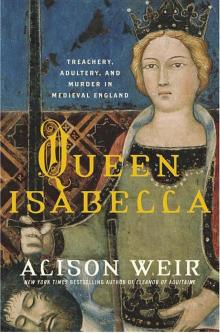 Queen Isabella: Treachery, Adultery, and Murder in Medieval England
Queen Isabella: Treachery, Adultery, and Murder in Medieval England Katheryn Howard, the Scandalous Queen
Katheryn Howard, the Scandalous Queen Arthur- Prince of the Roses
Arthur- Prince of the Roses The Wars of the Roses
The Wars of the Roses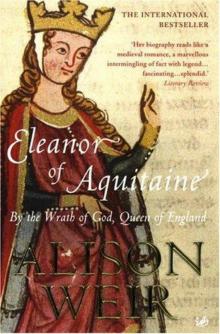 Eleanor of Aquitaine: By the Wrath of God, Queen of England
Eleanor of Aquitaine: By the Wrath of God, Queen of England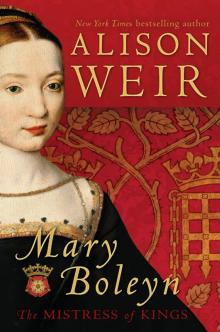 Mary Boleyn: The Great and Infamous Whore
Mary Boleyn: The Great and Infamous Whore Jane Seymour: The Haunted Queen
Jane Seymour: The Haunted Queen Anna of Kleve, the Princess in the Portrait
Anna of Kleve, the Princess in the Portrait Lancaster and York: The Wars of the Roses
Lancaster and York: The Wars of the Roses The Grandmother's Tale
The Grandmother's Tale The Princess of Scotland (Six Tudor Queens #5.5)
The Princess of Scotland (Six Tudor Queens #5.5) The Lady Elizabeth
The Lady Elizabeth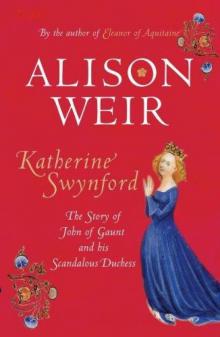 Katherine Swynford: The Story of John of Gaunt and His Scandalous Duchess
Katherine Swynford: The Story of John of Gaunt and His Scandalous Duchess The Curse of the Hungerfords
The Curse of the Hungerfords The Lost Tudor Princess: The Life of Lady Margaret Douglas
The Lost Tudor Princess: The Life of Lady Margaret Douglas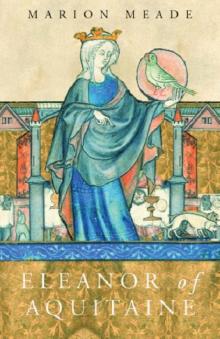 Eleanor of Aquitaine
Eleanor of Aquitaine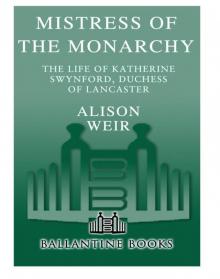 Mistress of the Monarchy
Mistress of the Monarchy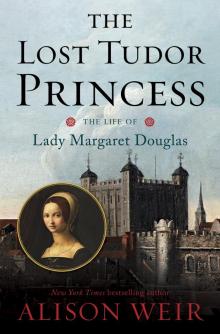 The Lost Tudor Princess
The Lost Tudor Princess Henry VIII
Henry VIII Anne Boleyn, a King's Obsession
Anne Boleyn, a King's Obsession A Dangerous Inheritance: A Novel of Tudor Rivals and the Secret of the Tower
A Dangerous Inheritance: A Novel of Tudor Rivals and the Secret of the Tower Elizabeth of York
Elizabeth of York Katherine of Aragon, the True Queen
Katherine of Aragon, the True Queen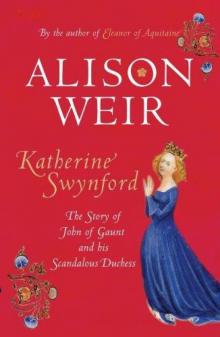 Katherine Swynford
Katherine Swynford Wars of the Roses
Wars of the Roses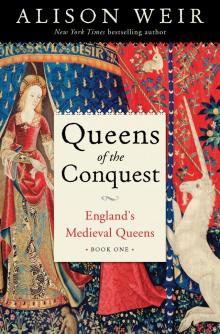 Queens of the Conquest
Queens of the Conquest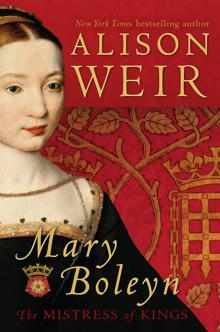 Mary Boleyn
Mary Boleyn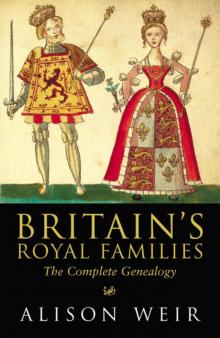 Britain's Royal Families
Britain's Royal Families The Tower Is Full of Ghosts Today
The Tower Is Full of Ghosts Today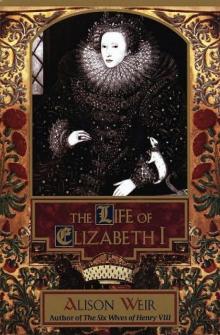 Life of Elizabeth I
Life of Elizabeth I Anne Boleyn A King's Obssession
Anne Boleyn A King's Obssession Lancaster and York
Lancaster and York Jane Seymour, the Haunted Queen
Jane Seymour, the Haunted Queen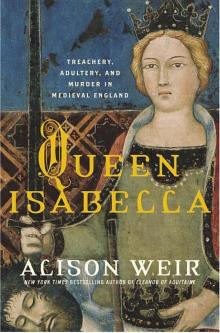 Queen Isabella
Queen Isabella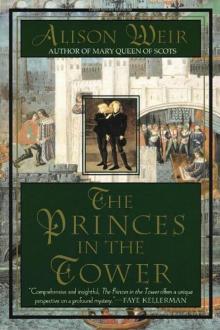 The princes in the tower
The princes in the tower